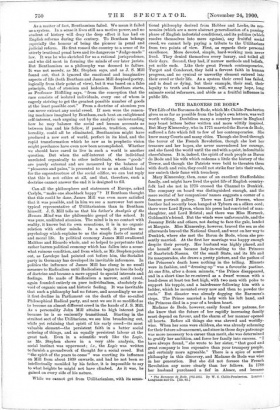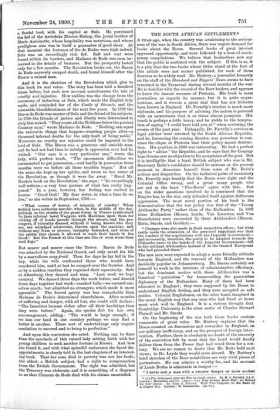THE BARONESS DE BODE.*
THE Life of the Baroness de Bode, which Mr. Childe-Pemberton gives us as far as possible from the lady's own letters, was well worth writing. Doubtless many a country house in England may boast letters better written and more wittily inspired. But Mary Kinnersley, who in 1775 married the Baron de Bode, suffered a fate which fell to few of her contemporaries. She knew many Courts and many cities. Though she lived through the terror of the French Revolution, though she lost her treasure and her hopes, she never surrendered her courage, and she faced the world until the end with a quiet, indomitable cheerfulness. It is, indeed, the spirit of such people as Baron de Bode and his wife which redeems a little the history of the Terror, and though the Patriots were bold to threaten them with death and rain, they could not strike fear into their souls, nor smirch their fame with treachery.
Mary Kinnersley, then, came of an excellent Staffordshire family, and might have lived the quiet life of English country- folk had she not in 1775 crossed the Channel to Dunkirk. The company on board was distinguished enough, and the mere recital of her companions' names suggests a corner of a famous portrait gallery. There was Lord Ferrers, whose brother had recently been hanged at Tyburn on a silken cord; there were Lord Byron, whom his peers had convicted of man- slaughter, and Lord Bristol; and there was Miss Horneck, Goldsmith's friend. But the winds were unfavourable, and the Jessamy Bride and others, not daring to face the gale, landed at Margate. Miss Kinnersley, however, braved the sea as she afterwards braved the National Guard, and went on her way to Dunkirk, where she met the Baron de Bode, whom she pre- sently married. At the first her marriage was happy enough despite their poverty. Her husband was highly placed, and she herself soon became lady-in-waiting to the Princess of Saarbriick-Nassau. Of the small State, and its life and its masquerades, she draws a pretty picture, and the pathos of the Princess's death loses nothing in the telling. Minuets were in fashion, and " dressing-up " was a favourite pastime. At one fete, after a dozen minuets, "the Prince disappeared, and in a short time he re-entered as a dwarf woman with a head-dress at least ten feet high, with two men with poles to support his tuppee, and a hairdresser following him with a ladder, which he mounted every now and then to powder the curls." But disaster was already dogging the Baroness's steps. The Prince married a lady with his left hand, and the Princess died in a year of a broken heart.
Madame de Bode, however, easily found new patrons, for she knew that the future of her rapidly increasing family must depend on favour, and the charm of her manner opened all hearts. Before all things she was shrewd and worldly- wise. When her sons were children, she was already scheming for their future advancement, and since in those days patronage was more necessary to a career than merit, she was determined to gratify her ambition, and force her family into success. "I have always found, "she wrote to her sister, "that good and great company is less expensive than your trumpery people, and certainly more agreeable." There is a spice of sound philosophy in this discovery, and Madame de Bode was wise in her generation. But she did not foresee the French Revolution any more clearly than her fellows. In 1788 her husband purchased a fief in A 'Nam, and became
London :
a feudal lord, with his capitol at Sulz. He purchased the fief of the Archduke Elector-Bishop, the jovial brother of Marie Antoinette, whose hospitality was notorious, and whose prodigious size was in itself a guarantee of good cheer. At that moment the fortunes of the de Bodes were high indeed.
Sulz was an exceedingly rich fief. Salt and coal were found within its borders, and Madame de Bode was soon im- mersed in the details of business. But the prosperity lasted only for a few months. The Revolution broke out, the Baron de Bode narrowly escaped death, and found himself after the Terror a rained man.
And it is the sketches of the Revolution which give to this book its real value. The story has been told a hundred times before, but each new account corroborates the tale of cruelty and injustice. How sudden was the change from the ceremony of induction at Sulz, which made the English lady smile, and reminded her of the Castle of Otranto, and the miserable bloodthirstiness of the next few years. In 1788 the Baron de Bode was master of Sulz and the friend of his subjects.
In 1790 the friends of justice and liberty were determined to strip him naked. "They count all the Noblesse below the poorest Country man," wrote Madame de Bode. "Nothing can equal the execrable things that happen—roasting people alive—a thousand infernal deaths for the only fault of being noble." Moreover, no cruelty nor injustice could be imputed to the lord of Sulz. The Baron was a generous and amiable man, and he had not had time to indulge in oppression even had he wished. "Our case is a very particular one," wrote the lady, with perfect truth. "The uncommon difficulties we surmounted to get possession,—and hardly in possession three months were we before all these troubles began." But all the same she kept up her spirits, and wrote to her sister of the Revolution, as though it were far away. "Read Mr. Burke's book on the Revolution," she says ; " 'tis exceedingly well written,—a very true picture of what has really hap- pened." In a year, however, her feeling was excited to horror. "Good God ! My dear sister, in what a time do we live," so she writes in September, 1792 :—
" What scenes of horror, of iniquity, of cruelty! When publick laws authorise murder, when, in the middle of the day, publicly in the streets of the great towns in France (authorised by their infernal laws) Waggons with Machines upon them for cutting off of heads parade through the streets, and the pas- sengers, if tolerably dressed, without it being known who they are, are adjudged aristocrats, thrown upon the machine, and without any form or process, instantly beheaded, and those of the rabble that choose it allowed to wash their hands in the blood ! But the French at this time are like or even worse than mad dogs."
But nearer and nearer came the Terror. Baron de Bode was attacked by the National Guard, and only saved his life by a marvellous sang-froid. Then for days he lay hid in the hay, while his wife confronted those who would have
murdered him, until at last he escaped over the frontier. And as by a sudden reaction they regained their equanimity. Safe at Altenburg, they danced and sang. "Last week we kept carnival. We danced three days the week before, and danced three days together last week—masked balls—we amused our- selves much; but admitted no strangers, which made it more agreeable." The forced gaiety was less remarkable than Madame de Bode's determined cheerfulness. After months of suffering and danger, with all lost, she could still declare : "The Israelites became richer after all their hardships than they were before." Again, she quotes Job for her own encouragement, adding: "The world is large enough ; if we lose our land in one country perhaps we may find a better in another. These sort of undertakings only require resolution to succeed and to bring to perfection."
And upon this conviction she acted. Nothing can be finer than the spectacle of this ruined lady setting forth with her young children to seek another fortune in Russia. And how she found it, and with what splendid endurance she faced dis- appointments, is clearly told in the last chapters of an interest- ing book. That her sons died in poverty was not her fault; the eldest, a British subject, had a right to compensation from the British Government. The right was admitted, but the Treasury was obdurate, and it is something of a disgrace to us that Clement de Bode died with his claims unsatisfied.











































 Previous page
Previous page